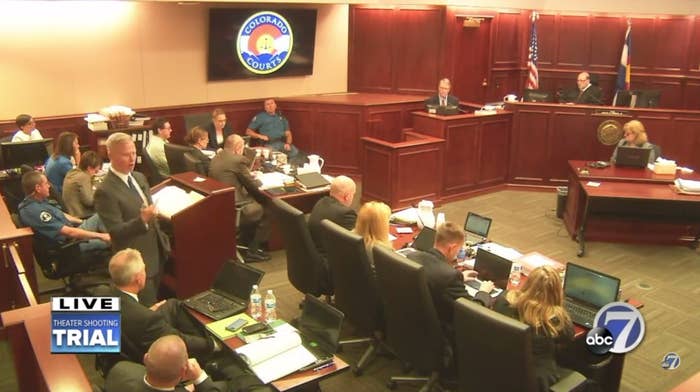
A psychiatrist testified Thursday that James Holmes was so psychotic at the time of the 2012 massacre at an Aurora, Colorado, movie theater, he was compelled to act on longstanding delusions about killing.
The psychiatrist, Jonathan Woodcock, was called by the lawyers defending Holmes, who has pleaded not guilty by reason of insanity to 12 counts of murder and 70 counts of attempted murder. His defense began after weeks of graphic testimony by victims of the shooting, the first responders, and various others who spoke on Holmes' accumulation of weapons and withdrawal from his neuroscience graduate program at the University of Colorado.
Holmes' lawyers have previously argued that his plans and actions inside Theater 9 on July 20, 2012, do not address the key question of the case: Whether he could determine right from wrong, and whether he could form the deliberation and intent to commit a crime. With Woodcock's testimony, they began their examination of Holmes' mental state in the days immediately following the shooting.
“It was my impression that he was mentally ill, he was severely mentally ill, and he had a psychotic mental illness,” said Woodcock, who first spoke with Holmes for more than two hours on July 24, 2012.
Holmes’ psychosis was defined by his delusions — that killing people would somehow protect him from himself — as well as an emotional flattening, Woodcock said.

“He was bored,” Woodcock said of their 2012 interview. “I found that absolutely extraordinary.”
The lack of a human, emotional response to his situation was the result of significant psychosis, Woodcock said. In the interview, Holmes was able to answer questions appropriately, a sign of organized thinking, he added, but the psychosis was still present.
“When I saw him, he was compensating in a lot of different ways. He was using his considerable intellectual capacities to stay organized,” Woodcock said, adding that the coping mechanisms failed when Holmes quit grad school.
Ultimately, it was likely that Holmes suffered from schizoid affective disorder, Woodcock said, and had shown symptoms of suicidal and homicidal thoughts for years. In his delusions, he believed he had to kill — it wouldn’t make sense to others, Woodcock explained, because it was an illness.
“I don’t believe he had the capacity to form an intent or to deliberate because of the complexity and overwhelming presence of these delusional compulsions,” Woodcock said.
But District Attorney George Brauchler questioned the psychiatrist’s expertise during cross-examination. A court-appointed psychiatrist who interviewed Holmes in 2014 previously testified that he had been sane at the time of the shooting.
Brauchler also questioned Woodcock's decision to allow a defense team investigator to sit in during the interview, as well as the quality of his notes.
“Most of it I don’t have primary memory of,” Woodcock said after several questions about his recollections. “It was three years ago.”
Brauchler eventually posed his own opinion of Holmes: An awkward young man who, proud of his prior performance in school, intentionally acted after he realized he couldn’t perform at the higher level of graduate school. And, Brauchler continued, don’t plenty of other people drop out of grad school?
“Yes,” Woodcock conceded, “but they aren’t psychotic.”
